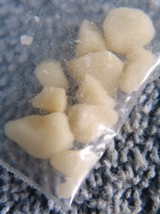Word of the Day:
Today's word is crackacardia (pron. "crak-uh-car-dee-yah").
Definition: condition often seen in a patient protesting, "I ain't no crack ho...I don't do no crack........I'm doing a lot betta....just one little rock today."
*****
I'm totally kidding. No such word. This is just something one of the Grady trauma fellows coined that I thought was great. In reality, cocaine (in our area, most often taken in the form of crack, which is just cocaine cut with baking powder) stimulates your sympathetic nervous system, which makes your heart beat fast, which is called tachycardia. For those of you who always wanted to know all about crack, here is some info I found on (where else?) Google:
"Crack" is the street name given to cocaine that has been processed from cocaine hydrochloride to a ready-to-use free base for smoking. Rather than requiring the more volatile method of processing cocaine using ether, crack cocaine is processed with ammonia or sodium bicarbonate (baking soda) and water and heated to remove the hydrochloride, thus producing a form of cocaine that can be smoked. The term "crack" refers to the crackling sound heard when the mixture is heated, presumably from the sodium bicarbonate.
On the illicit market, crack, or "rock," is sold in small, inexpensive dosage units. Smoking this form of the drug delivers large quantities of cocaine to the lungs, producing effects comparable to intravenous injection. These effects are felt almost immediately after smoking, are very intense, and do not last long.
On the illicit market, crack, or "rock," is sold in small, inexpensive dosage units. Smoking this form of the drug delivers large quantities of cocaine to the lungs, producing effects comparable to intravenous injection. These effects are felt almost immediately after smoking, are very intense, and do not last long.


